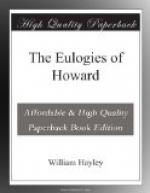“But leaving it to more able and eloquent panegyrists to celebrate the originality, the boldness, and all the various merit of his philanthropic exertions, I shall confine myself to a few remarks, and chiefly professional ones, on his invaluable character. It appears to me highly worthy of observation, that Howard, before he entered on his grand projects of Public Benevolence, was subject to those little, but depressive variations of health which have betrayed many a valetudinarian into habits of inaction and inutility. Happily for himself, and for mankind, this excellent person surmounted a constitutional bias to indolence and retirement. The consequence sequence was, he became a singular example of activity and vigour. His powers, and enjoyments of bodily and mental health, augmented in proportion to the extensive utility of his pursuits.
“Beneficial as his life has been to the world, his memory may be still more so. It may prove a perpetual blessing to mankind, if it dissipates, as it ought to do, a weak and common prejudice, which often operates as a palsy upon the first idea of a great and generous undertaking. The prejudice I mean is a hasty persuasion, frequently found in the most amiable minds, that some peculiar strength of nerve, some rare mechanism of frame, and extraordinary assemblage of mental powers, are absolutely requisite for the execution of any noble design. How greatly does it redound to the true glory of Howard to have given in his successful labours the fullest refutation of a prejudice, so inimical to the interest and the honour of human-nature! a prejudice, by whose influence, to use the words of our great Poet,
“—The native hue of Resolution Is sicklied o’er with the pale cast of Fear, And enterprizes of great pith and moment, With this regard, their currents turn awry And lose the name of action.”
“The life and character of Howard, if they are justly considered, may not only annihilate this pernicious prejudice, but tend to establish an opposite and consolatory truth. His example may shew us, that some degrees of bodily weakness and mental depression may be most happily cured by active exertion in the service of mankind. Perhaps there never existed a more striking proof how far a noble impulse, communicated to the mind by a project of extensive Benevolence, may invigorate




